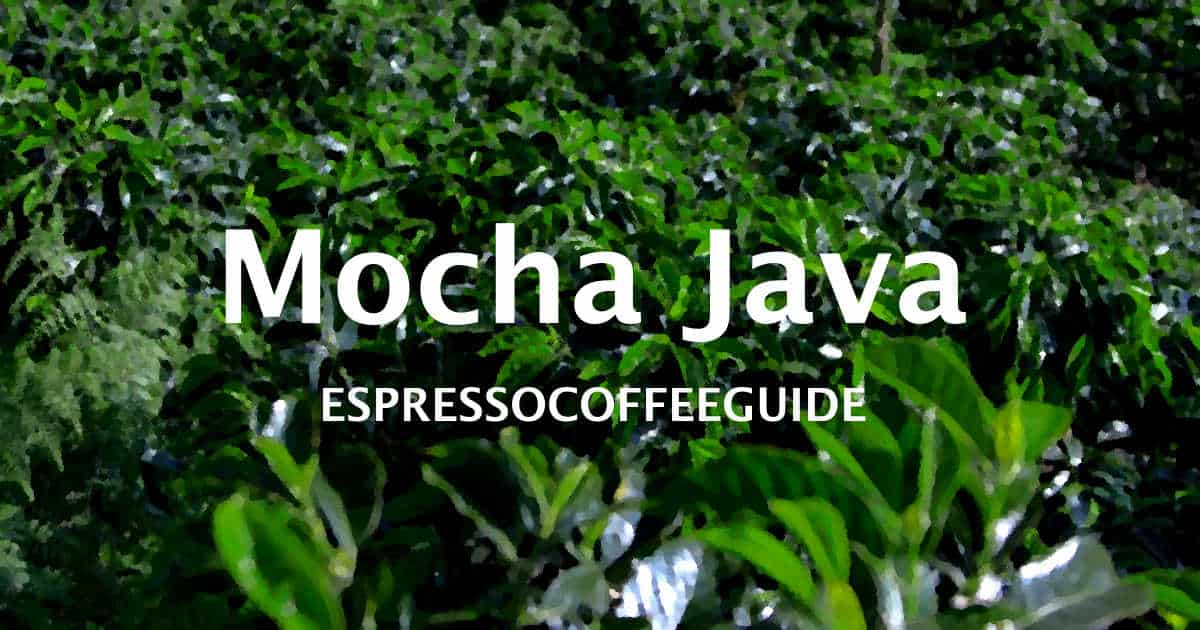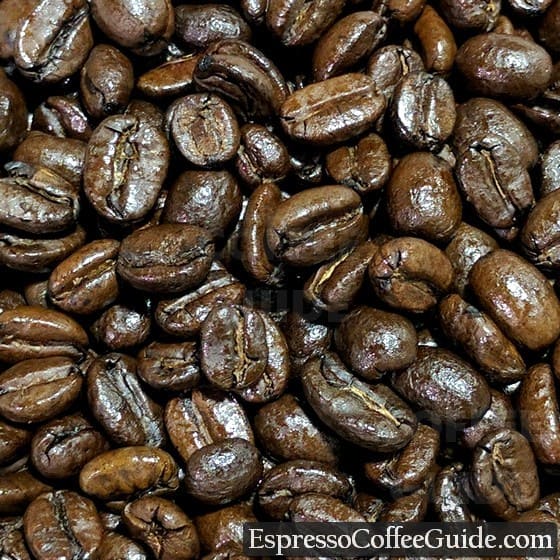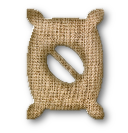A coffee blend of Arabian (Yemen) Mocha coffee and Indonesian Java Arabica coffee. Mocha Java is said to be the world's oldest coffee blend, combining two of the best premium coffee beans with complementary tasting characteristics.

The lively intensity and pleasant wildness of the Yemen Mocha provides a wonderful complement to the clean and bright smoothness of the Java coffee, which is one of the most popular Indonesian coffees.

Jump to:
Blends
The two types of coffee beans—Mocha and Java—are a natural fit, creating a complex yet well-balanced coffee blend.
In olden days, coffee beans from Yemen—where coffee has grown since the 15th century (see World's Best History of Coffee)—were shipped in the wooden hulls of sailing ships of sailors at the great Yemen port of Mocha [Mokha]. This port was one of the world's busiest locations at the time because it was the primary sea port for the sea route to Mecca.
Many of these sailors arriving at the port of Mocha were coming home from Java Island, and so this is how the traditional coffee blend of Mocha and Java coffee beans occurred—a happy accident of history that produced this coffee blend that is still prized today as some of the best coffee.
Today
Mocha Java coffee traditionally includes one part Yemen coffee to two parts Indonesian Java Arabica coffee. This traditional formula is increasingly rare in today's world coffee market, however.
Many commercial blends of Mocha Java, instead of using Mocha and Java, substitute other coffees for both the Yemen Mocha and the Java Arabica. This may be done to mimic the classic Mocha Java taste, even using finer coffees such as an Ethiopian Harrar or another bright (high acidity) coffee instead of the Mocha (or another fine Indonesian coffee), or another full and round coffee for the Java, and also altering the proportions.
Buying
Blending different origins in this way allows roasters to preserve the flavor the the tradition Mocha Java Blend even when exports aren't available from those countries due to conflicts within the region and trade barriers. Green coffee importers in some countries (the United States) are barred entirely from importing Yemeni unroasted green coffees and other products.
As coffees from Yemen are almost impossible to source due to political conflicts, the majority of Mocha Java is a blend of other single-origins. Buying a Mocha Java coffee will vary in quality from roaster to roaster depending on their goal with the taste (mimick the original, or more chocolate-centric because of customer perception) so trying multiple is advised.
Wherever you order from, make sure to get whole beans that are fresh roasted rather than sitting on shelves. Retailers like grocery stores and Amazon that sell branded coffees have a long distribution channel - coffees are bulk roasted then packed and shipped and processed at warehouses - this all takes weeks and sometimes months, leaving you with a stale coffee at the end of the day.
Java coffees are frequently available Organic certified, but Yemen coffees aren't.
Not the chocolate drink
A cafe mocha is a term used to refer to a specialty drink available at many cafes and restaurants that's comprised partly of hot chocolate and part coffee. This has no relation at all to the traditional coffee blend and is not indicative of the flavor of real Mocha Java coffee.
Espresso
The complex and balanced flavor of a Mocha Java blend makes it ideal for an espresso roast - providing characteristics that shine in a very dark roast. Espresso blends made by experienced roasters typically integrate some Robusta beans for the additional caffeine content and crema, and can actually enhance the overall flavor of the coffee.
Mocha Java coffee is also called Arabian Mocha Java coffee.
Buy Java Coffee Beans
- ✔️ Fresh roasted to order
- ✔️ 100% high qualtiy Arabica coffee
- ✔️ Custom grind (or whole bean)
- ✔️ 1-way valve, laminate bag (for freshness)
- ✔️ Bulk discounts
Green Coffee Production
| Year | 60kg bags | Coffee grown |
| 2016 | 10,000,000 bags | 1,320,000,000 pounds |
| 2015 | 12,317,475 bags | 1,625,906,713 pounds |
| 2014 | 11,418,277 bags | 1,507,212,604 pounds |
| 2013 | 11,265,194 bags | 1,487,005,621 pounds |
| 2012 | 11,518,538 bags | 1,520,447,016 pounds |
Green Coffee Exports
| Year | 60kg bags | Coffee exported |
| 2016 | 0 | 0 pounds |
| 2015 | 7,985,480 | 1,054,083,360 pounds |
| 2014 | 6,679,280 | 881,664,960 pounds |
| 2013 | 9,954,190 | 1,313,953,080 pounds |
| 2012 | 11,257,540 | 1,485,995,280 pounds |
Data may not be available for the most recent year.
Source: ICO
Facts

























produced 1,625,906,713 lbs
exported 1,054,083,360 lbs
That's over 65% exported!
Sounds like a lot? It's actually 8.1% of the coffee grown worldwide.

(that's 2,461 to 3,937 ft)
Source: ICO


Ronald Dunne
This reminds me of the days years ago when I bought Ethiopian and Mocha coffees and blended them myself with Javanese coffee... I remember the Ethiopian as being quite strong and a little bitter. That supply was cut off after Haile Selassie was overthrown and communists took over most of Ethiopia. The mixes with the Java and mocha worked well. Now getting Yemeni coffee can be difficult as a result of the years-long civil war there. If the islamo-fascist rebels take control we will kiss that source good bye too.. There is nothing as good as a cup of java, properly made from good beans, in the morning!
Trudy H.
This is one of my favorite coffees of all time ,nice and sweet and full flavored without being overpowerin. I highly recommend everyone try it if they are able to find a good source for it .Alwyas fresh roasted never buy it after it has been sitting on the shelf for too long the oils go bad and ruin your coffee maker. My mouth is watering right now just thinking about it I think I'll go have a cuppa.
EspressoCoffeeGuide
Thanks for sharing your feedback Trudy! We find most people will enjoy the Mocha Java blend at some point, it's a unique flavor that definitely deserves a try. Where did you get yours from?
Trudy H.
I don't remember it was a small coffee shop when I was vacationing in downtown Portland .They had 4 or 5 unique contries and a few unique blends.